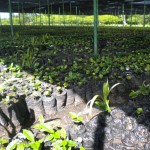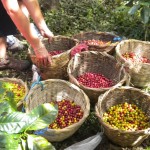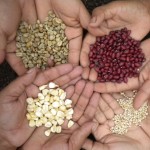Coffee is the most traded good in the world behind oil, due to the fact that most coffee is grown in developing countries but consumed in developed countries1. Although coffee is part of many people’s ‘daily grind,’ most do not realize that before reaching their mug or their church coffeepot their coffee has been grown, picked, shelled, washed, dried, sorted, exported, roasted, ground, and brewed. Decisions about which sort of coffee to purchase and drink have far-reaching implications beyond the local grocery store, café, or church kitchen.
I was in my second-to-last semester as an undergraduate at the University of Wisconsin-Madison when I first met two very inspiring Nicaraguan coffee farmers. They were members of La Fundación Entre Mujeres (FEM) (Foundation Among Women)’s all-female coffee cooperatives and they had come to speak with my “Latin American Culture in the Age of Globalization” class. They were participating in an exchange program coordinated with Just Coffee, a coffee roaster in Madison that not only pays a premium to purchase their specialty organic coffee beans, but also has a supportive relationship with the women farmers that extends beyond the business table. In this exchange program, coffee farmers come up to Madison to share what they are doing and coffee consumers from Madison and around the world go to Nicaragua to for an in-depth view of the production side of coffee and the inequalities that plague this system. As someone interested in the field of international development and with an appreciation for the importance of women in any development project, I was captivated by FEM’s mission of empowering women through education, access to resources for economic development, and fighting for gender equality. I stayed in touch with the women of FEM over email and they graciously accepted my proposal of an internship with the economic development side of their organization. In anticipation of my trip, I applied for and was awarded a grant from the Latin America, Caribbean & Iberian Studies Program at Wisconsin to cover some of my expenses and I molded one of my final research projects around fair trade and organic coffee certification schemes in northern Nicaragua. This research left me feeling like I had a good grasp of challenges facing smallholding coffee farmers, but there was no way a largely publication-based research project could have prepared me for what was to come: in January 2012, weeks after graduating with a bachelor’s degree in International and Environmental Studies, I moved to Estelí, Nicaragua, to embark on a journey that would teach me in six months more than I ever knew about feminism, activism, social justice, cooperatives, and of course coffee.
“The Land of Lakes and Volcanoes”
Nicaragua is a primarily Spanish-speaking Central American country south of Honduras and north of Costa Rica. It has a population of about 6 million people and functions as a presidential representative democracy. Roman Catholicism has traditionally been the religious majority, although Evangelical Christian and Mormon followers are on the rise. I was struck by Nicaraguans’ deep faith in God. Nicaragua is currently the second-poorest country in the Western Hemisphere (behind Haiti), with 48% of the population living below the poverty line and remittances (funds sent into the country by Nicaraguans living abroad) at about 15% of the GDP as of 2008.
In considering Nicaragua’s present, it is important to remember certain aspects of its past. Nicaragua was under Spain’s rule for almost three hundred years and gained independence in 1821. From approximately 1927-1979, the Somoza family and their puppet governments ruled Nicaragua through dictatorships characterized by corruption, censorship of the media, repression of civil liberties, election manipulation, intimidation, and gross human rights violations including torture and murder against their opposition. Popular discontent and deteriorating social conditions led opposition to build into revolution against the Somoza government in the 1960s and 1970s, culminating in intense internal fighting from 1978-1979 and an estimated 50,000 people killed. Many consider this fighting to have been a proxy war of the Cold War, wherein the United States secretly supported the Somoza government in what is now know as the Iran-Contra affair. But the Somozas were defeated and the Sandinista National Liberation Front (Frente Sandinista de Liberación Nacional – FSLN) took power. While women had held leadership positions within the FSLN during the revolution, they were not allowed any authority in post-revolution Nicaragua. In their fight for equality since then lie the beginnings of the modern feminist movement in Nicaragua.
I lived in the town of Estelí, which is located in the northern mountainous region of Nicaragua. Much of the fighting that had happened in the revolution took place in that region, and it remains strongly Sandinista to this day. Being there, I sensed the recent reality of the revolution: anyone over the age of thirty had been involved either in the revolution or the fallout thereafter, and many had lost close family members. I believe that this reality foments a desire for peace at any cost, with President Daniel Ortega pushing the limits on media censorship, granting political power to the Catholic Church, and using other political tactics to help him gain more power.
Coffee Trade
Coffee is vital to Nicaragua’s economy: it accounts for almost a quarter of the national export value.2 About 150,000 families are involved in coffee harvesting, which constitutes almost one third of total rural employment3. There are approximately 48,000 coffee farms in Nicaragua, 80% of which grow fewer than 3.5 hectares (9 acres) of coffee. The 20% of farms that grow more than 3.5 hectares produce over 85% of the coffee harvest in Nicaragua due to intensified management practices4.
As coffee is traded on the world market, producers generally must take their price as given. In the early 1990s, increasing over-production, geo-political shifts and the collapse of the International Coffee Agreement led to plummeting and volatile coffee prices and devastated coffee producers sought any way to gain control over the price of their coffee. At the same time, consumers were becoming more aware of low living conditions in many developing countries, creating the perfect situation for fair trade to flourish. The concept of fair trade was developed to provide an alternative to free trade and other development projects which used aid or protectionism to benefit small-scale producers. Fair trade certification guarantees minimum prices for coffee, premiums to be used by cooperatives for social development, improved labor rights, and long-term trading relationships4. All fair trade producers must be small-scale and members of a democratically-organized cooperative. Buyers in the system pay a ‘fair price’ in addition to offering fair trade cooperatives varying levels of support5. Organic production is associated with fair trade for a few reasons. Fair trade certification standards do not require organic production, but do encourage farmers “to work towards organic practices where socially and economically practical.”4 Conventional agriculture generally uses chemical fertilizers and pesticides, while organic certification requires that farmers use no synthetic products. Organic coffee certification requires coffee to be shade grown so that areas of production can provide ecosystem services similar to forests such as animal habitat, carbon dioxide storage, and reduced runoff to protect watersheds and deter erosion. Advantages of organic agriculture touted over conventional agriculture include health benefits, environmental sustainability, soil maintenance, water protection, lower greenhouse gas emissions, and providing biodiversity, among others.
Fair trade has been highly criticized, mainly because the price premiums in many cases do not bring producers out of poverty in the way that consumers are led to believe. Due to this fact, Just Coffee has made an effort to guarantee an even higher price premium to the producers they buy from and to create longstanding relationships and systems of support with them.
FEM (La Fundación Entre Mujeres)
FEM is a feminist non-profit organization dedicated to empowering rural women in northern Nicaragua. They work in 15 rural communities committed to empowering women ideologically, economically, and politically. This empowerment happens through programs leading the fight against violence toward women, promoting and facilitating education for women and girls, gender awareness and equality, and access to the resources for production for women with a focus on sustainability towards the communities and the environment. As FEM works integrally to empower women, my internship also functioned within the various areas of the organization. However, my concentration was in the economic empowerment project. This area works with six women’s cooperatives from six of the fifteen rural communities in which FEM works. The goals of the project are to increase the output and improve the quality of the coffee the women are growing, to help them diversify their crops so that they can grow their own food and are not completely dependent on their coffee profit, and to help commercialize and sell their products in local and national markets. They export their specialty coffee beans under fair trade and organic certifications. I helped train the women on how to manage their farms in order to achieve organic certification, assisted in designing a line of labels and other materials for the products the women sold under the Las Diosas (The Goddesses) brand in the local organic market in Estelí, worked in the market each week, and helped coordinate the construction of a café where Las Diosas coffee would be sold.
In Nicaragua, violence against women and machismo culture are as pervasive as coffee and corn tortillas. Maternity is not viewed as voluntary and law enforcement does little to protect a woman suffering from domestic violence, especially in rural areas. It is telling that a word, femicide (femicidio), has been created to describe the act of a man killing a woman essentially because of her gender. FEM offers psychological and legal support to women survivors of domestic violence. They run workshops teaching women about equality and their human right to live free of violence. I was involved in many marches and activities calling attention to violence against women and calling for justice against aggressors. In Nicaragua it is very hard for a woman to own land or to attain certain levels of education and jobs. For this reason, it is very impressive that that the women organized under FEM have created all-female coffee cooperatives, the first in the country. They have worked hard for what they have and are very proud!
The women organized with FEM are determined to take ownership over the entire coffee value chain in order to gain more control and profits throughout the in-country value chain. They have a fertilizer plant, a coffee green house, and bean sheller for each coop (a sheller is a machine that strips the coffee cherry’s shell to free the bean inside), a coffee roaster for beans that do not get exported, a packaging device, and a post at the weekly organic market in Estelí. Younger women are being trained in accounting, coffee tasting, agriculture, ecology, tourism, and other aspects of the process in order to sustain the progress made by older generations and deter their emigration. I gave English classes to some of FEM’s educators and university students.
Food (Justice) for Thought
In free trade there are winners and losers, a truth epitomized by the trade of coffee. While it is unlikely that the demand for coffee will fall in light of this fact, there are valid efforts to change the system. As consumers, we can use our purchases to challenge these injustices and take steps towards equality. By making responsible purchases and spreading awareness, we can guarantee that our coffee hour is supporting equality, the environment, and a more just food system.
Editors’ Note: If your congregation is interested in distributing fair trade coffee through Lutheran World Relief, see http://lwr.org/getinvolved/fairtrade/coffee_tea.
Let’s Talk:
Has fair trade entered into discussions about food practices at your church or in your home?
- FEM’s coffee greenhouse
- Coffee being harvested
- Green coffee beans (top left), Nicaraguan red beans (top right), corn (bottom left) and millet, vital Nicaraguan crops, held in women farmers’ hands
Notes
- ^ Talbot, John M. Grounds for Agreement: The Political Economy of the Coffee Commodity Chain. Lanham, Md.: Rowman & Littlefield, 2004.
- ^ http://www.cetrex.gob.ni/website/servicios/estadisticas.jsp
- ^ Ruben, Ruerd, and Guillermo Zuniga. “How Standards Compete: Comparative Impact of Coffee Certification Schemes in Northern Nicaragua.” Supply Chain Management: An International Journal 16.2 (2011): 98-109.
- ^ Valkila, Joni. “Fair Trade Organic Coffee Production in Nicaragua – Sustainable Development or a Poverty Trap?.” Ecological Economics, 68.12 (2009): 3018-3025.
- ^ Beuchelt, TD, A Kiemen, and M Zeller. “Value Adding Through Certification? Insights from the Coffee Sector in Nicaragua.” Markets, Marketing and Developing Countries: Where We Stand and Where We Are Heading, (2010): 115-120.




